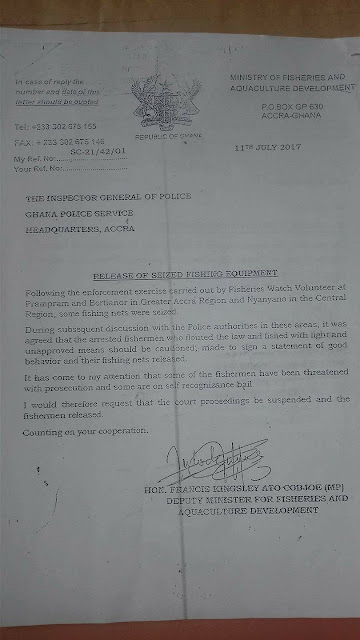NET CONFISTICATION: A Blunt Management Instrument
 |
| Net making 'aboa akese', Butre, Western Region, Ghana |
This practice continued but with time, the population increased. To compensate for the increase in population, the number of canoes increased and so did the number of fishermen and the fishing methods changed. Fishermen got access to new fishing equipment - they no longer relied on the handwoven nets but rather 'ready-made' nets. Fishermen saw fishing as a business and no longer a means of subsistence.
Outboard engines were attached to their traditional dugout canoes, iceboxes were built and one-day fishing trips now extended to 3 or 4 days! Net lengths increased and mesh sizes decreased as there was now access to a cheaper form of net, the mono-filament nylon nets. "It catches fish faster because the fish cannot see it in the water and it is lighter," said one fisherman to me. With all these, the fish catch dwindled, prompting fishermen to get innovative in a detrimental way -the use of light, chemicals and dynamite in fishing. These raised concerns, compelling government to clamp down on these illegal practices - a laudable idea it would seem but I beg to differ.
Enforcement only works when the people of the law are meant to understand and appreciate it. Besides, a one-time task force would only do a nine-day wonder job and that is it. Seizure in the face of cheaper nets and continued importation of unapproved mesh sizes only defeats the objective of management. Also, the seizure is not the solution to the problem - the problem, in this case, was seen as the use of monofilament nylon nets by fishermen.
Studies have debunked some of the reasons-ghost fishing and the effectiveness of the net-given for the seizure of these mono-filament nets. Confiscation, which is a BLUNT MANAGEMENT OPTION, will only promote innovation which Ghanaian fishermen are noted for. In light of these studies that have shown that ghost fishing is not as true as we thought it to be and that mono-filament nets are not as effective; I will advocate for a better and more effective management option which will reduce pressure on our declining fish stock, particularly the sardines - which is the mainstay of artisanal fisheries in Ghana. The call for management in mesh size and length of nets instead of a total ban on a net that is cheap and poor fishermen can afford will be a better option.
This is an option I believe will be welcomed by the resource users.


Nyce write up. Can you plseas help me with these questions:Since when has the mono filament net been in existence?What do you think is the proper way of going about this management issue as you seem not to be in line with what the govt is doing?
ReplyDeleteIt has been around for not less than 20 years now. From what I have gathered, fishermen prefer the use of the monofilament net because:
Delete1. It is cheaper than the twine nets.
2. Catches fish 'faster' hence reducing fishing time and fuel. Faster here is in inverted comma because if both monofilament nylon net and twine multifilament nets are left for a soak time of 12 to 16 hours; the total catch essentially the same.
I will suggest that mesh size be regulated and there should be prescribed net length a fishermen can have as well as the number of net. This should be starting point.